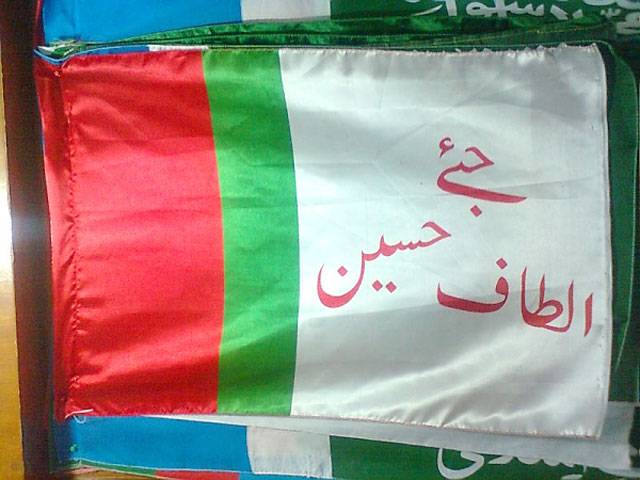LAHORE - With a turbulent history of over three decades, the MQM in Pakistan has witnessed many ups and downs during the period, though it has been the dominant political force in two major cities of Sindh since it inception in 1984.
The story of MQM starts with the formation of a student organisation, All Pakistan Muhajir Student Organisation (APMSO) in 1978.
Initially, it was established to counter the Islami Jamiat-e-Talba, a student wing of Jamat-e-Islami Pakistan which ruled the roost in Karachi at that time.
It soon transformed itself into Muhajir Qaumi Movement in 1984 under the leadership of Altaf Hussain and Azim Ahmad Tariq with Aafaq Ahmad and Amer Ahmad Khan being the founding members.
It was launched to protect and fight for the rights of the Muhajir community against the alleged discrimination in employment opportunities and admissions in educational institutions.
In 1997, the MQM changed its nomenclature by removing the word ‘Muhajir’ and replacing it with ‘Muttahida’ to shun its ethnic image.
Generally known as a secular political party mainly representing the Urdu-speaking population in the urban areas of Sindh, it wields significant power in Karachi and Hyderabad. MQM won the November 1987 Local Bodies elections in the two cities.
Currently being the second largest party in Sindh Assembly and the fourth largest in the National Assembly, the MQM has earned the distinction of being the only political party in Pakistan which has been part of almost every government in the Centre and Sindh since the 1980s.
In 1988, it was part of the coalition government with PPP. After the October 1990 elections it made its alliance with Pakistan Muslim League (PML). It was during this period that small factions of MQM separated themselves from the main body.
The largest among these factions is MQM Haqiqi which was formed by Afaq Ahmad and Amir Khan in 1993. It is generally believed that MQM Haqiqi was formed with the collusion of Pakistani establishment to weaken the MQM.
From 1992 to 1994, the MQM was the target of a military-led operation ‘clean-up’, as it faced a number of allegations at that time.
Thousands of party workers and supporters were killed and many went missing during the operation, according to the MQM.
The crackdown against MQM started after the then government of Mian Nawaz Sharif gave a green signal to the Army to target 72 'big fish'.
The Federal government then justified the action to purge Karachi of the criminal elements and to seize unauthorised arms.
This was followed by violence as the MQM organised protests and strikes.
It was at this point of time that Altaf Hussain left the country and sought political asylum in the United Kingdom. In the 1990s, the MQM was accused of fanning violence, killings, torture and other abuses though its leadership denied its involvement in these acts.
During ‘Operation Clean-up’, Altaf’s party was accused of planning to create a separate state for the Mohajirs. It then came to be known as 'Jinnahpur Plan'. But later on, some senior Army officers, including Brigadier (Retd) Imtiaz and General (Retd) Naseer Akhtar, absolved the MQM of this charge as they dubbed it "nothing but a drama". They also denied the existence of map of Jinnahpur.
On 22 November, 2009, Pakistan government released a limited list of beneficiaries of the controversial National Reconciliation Ordinance (NRO) enacted by Musharraf government which granted amnesty to politicians, political workers and bureaucrats who were accused of corruption, embezzlement, money-laundering, murder and terrorism between 1 January 1986 to 12 October 1999.
The list also included some MQM leaders allegedly involved in cases of corruption and murder. The names of Altaf Hussain and Farooq Sattar figured prominently in the list.
In 2006, the Federal Court of Canada declared the MQM a terrorist organisation. The entry of party members to Canada was banned considering them a serious security threat to the country. The court also accused the MQM of its involvement in the harassment of political opponents and using the proceeds of crime to fund the illegal party activities.
In June 2014, the Metropolitan Police raided the London home of its leader, Altaf Hussain, on suspicion of money-laundering. Investigation is also underway in respect of Imran Farooq murder case by the Scotland Yard police.
Friday, November 22, 2024
MQM: a party with turbulent history

FBR shuts down five top Islamabad restaurants over fake invoices
10:55 AM | November 22, 2024
Let Us Defeat Antimicrobial Resistance Using All Available Vaccines
November 22, 2024
Biden calls ICC arrest warrants for Israeli leaders 'outrageous'
10:45 AM | November 22, 2024
BoK celebrates Women Entrepreneurship Day
November 22, 2024
-
Hunger crisis to increase in South Sudan, warns UN
-
Hunger crisis to increase in South Sudan, warns UN
-
Pakistan’s judiciary champions climate justice at COP29 in Baku
-
Punjab struggles with persistent smog as Met Office forecast rainfall
-
Punjab residents face escalating smog crisis as pollution levels soar across country
-
Qatar says Hamas 'no longer welcome' in Gulf state
UN Crossroads
November 22, 2024
Smog Trade-off
November 22, 2024
Undersiege Again
November 22, 2024
Land of Vigilantes
November 21, 2024
United in Genocide
November 21, 2024
Proposal to counter increasing cases of harassment
November 22, 2024
Critique of RFE/RL’s Coverage of the SCO Summit
November 22, 2024
Real vs Reel
November 22, 2024
Independent Supreme Court
November 21, 2024
Fat Loss Fantasy
November 21, 2024
ePaper - Nawaiwaqt
Nawaiwaqt Group | Copyright © 2024





